Change Management: Business Problem, Solutions, and Recommendations
VerifiedAdded on 2023/01/05
|11
|952
|60
Presentation
AI Summary
This presentation examines a critical business issue: change management within an organization facing resistance to new technological tools and techniques. It identifies the problem's impact, including reduced efficiency, increased time to perform activities, and customer dissatisfaction. Several change management models are presented, including Lewin’s, Kotter’s, and Thorley’s, with their advantages and limitations discussed. The recommended solution is Thorley’s model, due to its cost-effectiveness and focus on addressing employee resistance, which aims to foster profitability and sustainability. The paper concludes by emphasizing the importance of change management for organizational growth and efficiency, highlighting the role of Thorley’s model in overcoming employee resistance and improving profitability. References to academic sources are included to support the analysis.
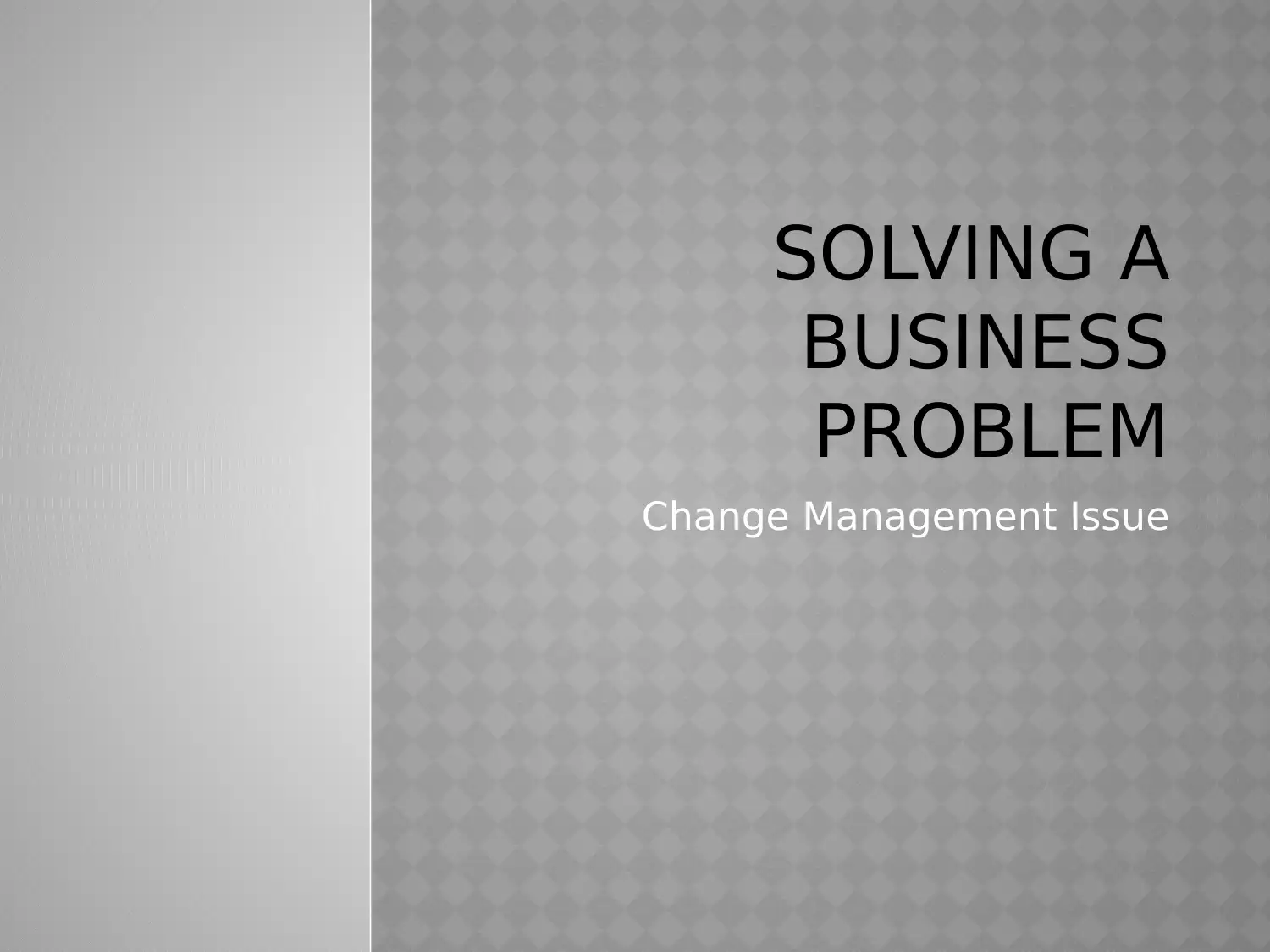
SOLVING A
BUSINESS
PROBLEM
Change Management Issue
BUSINESS
PROBLEM
Change Management Issue
Paraphrase This Document
Need a fresh take? Get an instant paraphrase of this document with our AI Paraphraser
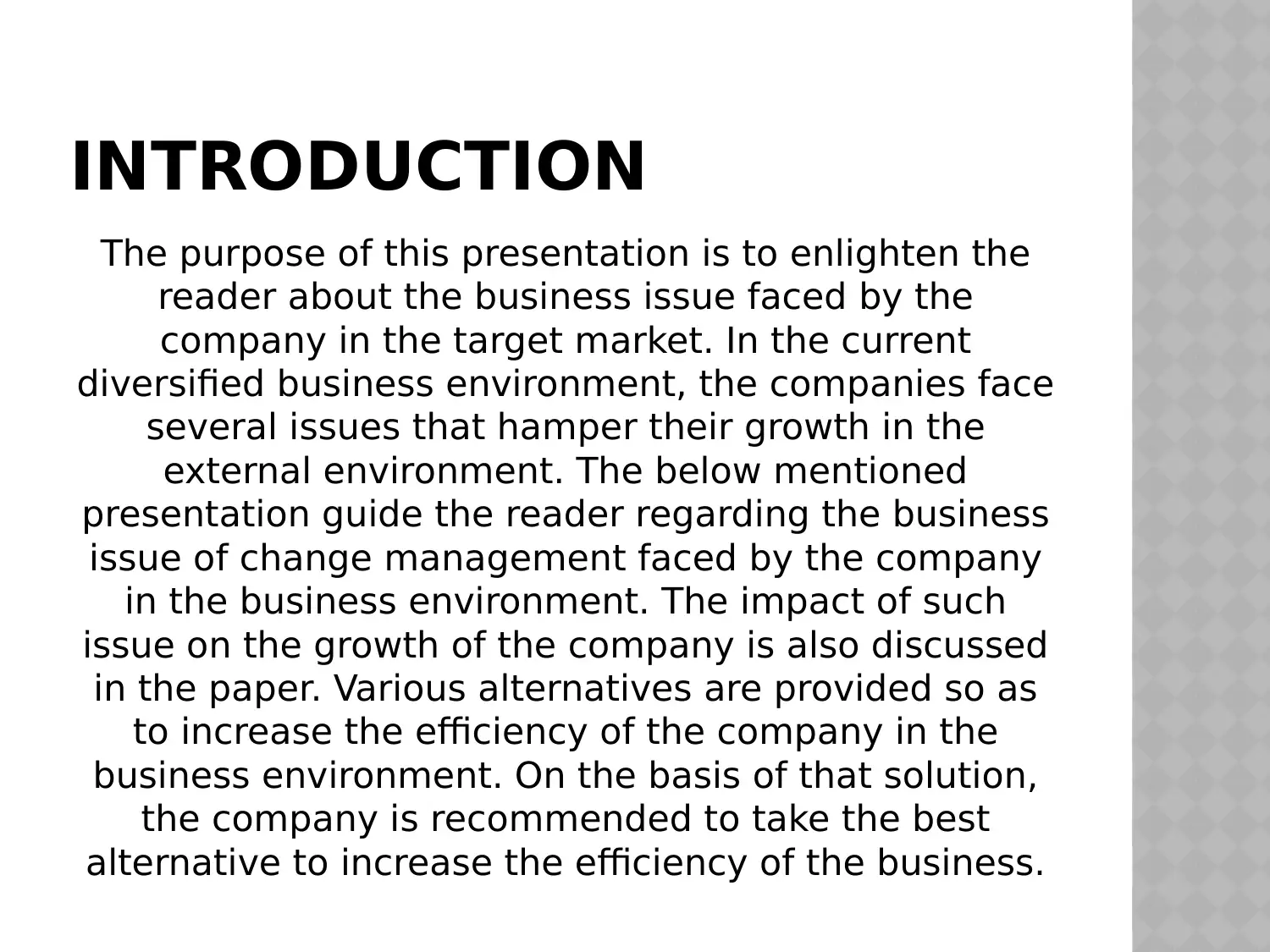
INTRODUCTION
The purpose of this presentation is to enlighten the
reader about the business issue faced by the
company in the target market. In the current
diversified business environment, the companies face
several issues that hamper their growth in the
external environment. The below mentioned
presentation guide the reader regarding the business
issue of change management faced by the company
in the business environment. The impact of such
issue on the growth of the company is also discussed
in the paper. Various alternatives are provided so as
to increase the efficiency of the company in the
business environment. On the basis of that solution,
the company is recommended to take the best
alternative to increase the efficiency of the business.
The purpose of this presentation is to enlighten the
reader about the business issue faced by the
company in the target market. In the current
diversified business environment, the companies face
several issues that hamper their growth in the
external environment. The below mentioned
presentation guide the reader regarding the business
issue of change management faced by the company
in the business environment. The impact of such
issue on the growth of the company is also discussed
in the paper. Various alternatives are provided so as
to increase the efficiency of the company in the
business environment. On the basis of that solution,
the company is recommended to take the best
alternative to increase the efficiency of the business.
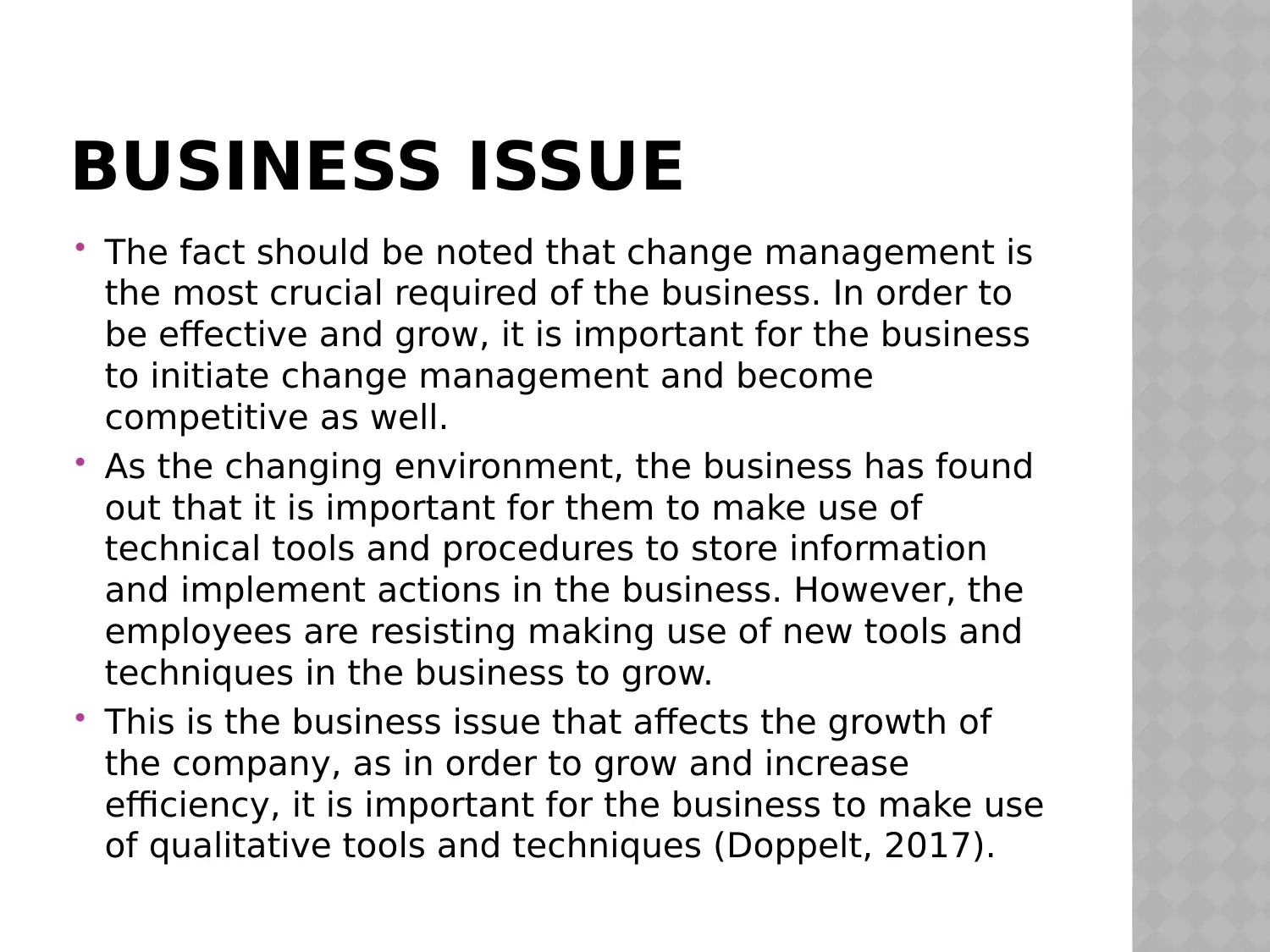
BUSINESS ISSUE
The fact should be noted that change management is
the most crucial required of the business. In order to
be effective and grow, it is important for the business
to initiate change management and become
competitive as well.
As the changing environment, the business has found
out that it is important for them to make use of
technical tools and procedures to store information
and implement actions in the business. However, the
employees are resisting making use of new tools and
techniques in the business to grow.
This is the business issue that affects the growth of
the company, as in order to grow and increase
efficiency, it is important for the business to make use
of qualitative tools and techniques (Doppelt, 2017).
The fact should be noted that change management is
the most crucial required of the business. In order to
be effective and grow, it is important for the business
to initiate change management and become
competitive as well.
As the changing environment, the business has found
out that it is important for them to make use of
technical tools and procedures to store information
and implement actions in the business. However, the
employees are resisting making use of new tools and
techniques in the business to grow.
This is the business issue that affects the growth of
the company, as in order to grow and increase
efficiency, it is important for the business to make use
of qualitative tools and techniques (Doppelt, 2017).
⊘ This is a preview!⊘
Do you want full access?
Subscribe today to unlock all pages.

Trusted by 1+ million students worldwide
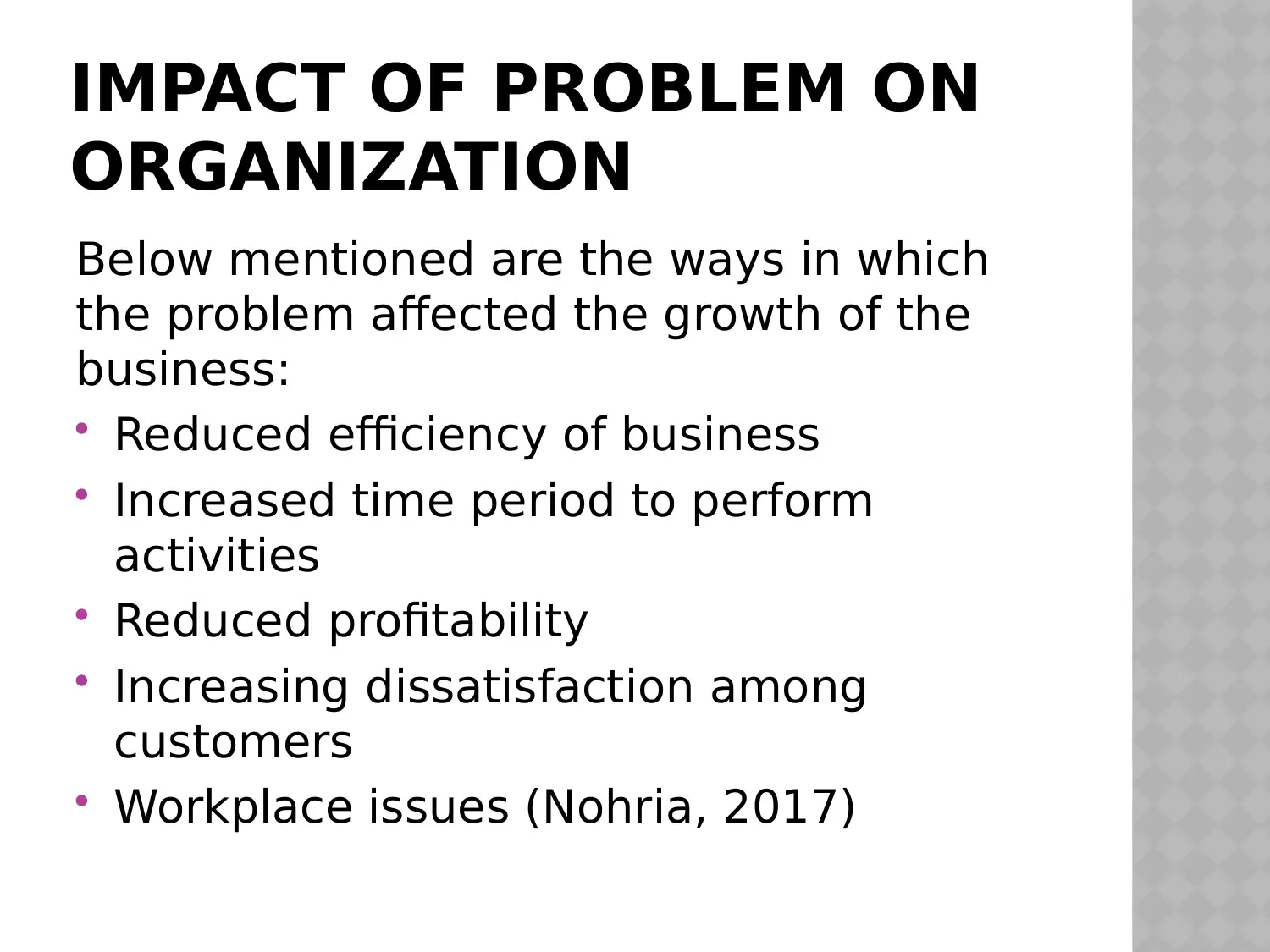
IMPACT OF PROBLEM ON
ORGANIZATION
Below mentioned are the ways in which
the problem affected the growth of the
business:
Reduced efficiency of business
Increased time period to perform
activities
Reduced profitability
Increasing dissatisfaction among
customers
Workplace issues (Nohria, 2017)
ORGANIZATION
Below mentioned are the ways in which
the problem affected the growth of the
business:
Reduced efficiency of business
Increased time period to perform
activities
Reduced profitability
Increasing dissatisfaction among
customers
Workplace issues (Nohria, 2017)
Paraphrase This Document
Need a fresh take? Get an instant paraphrase of this document with our AI Paraphraser
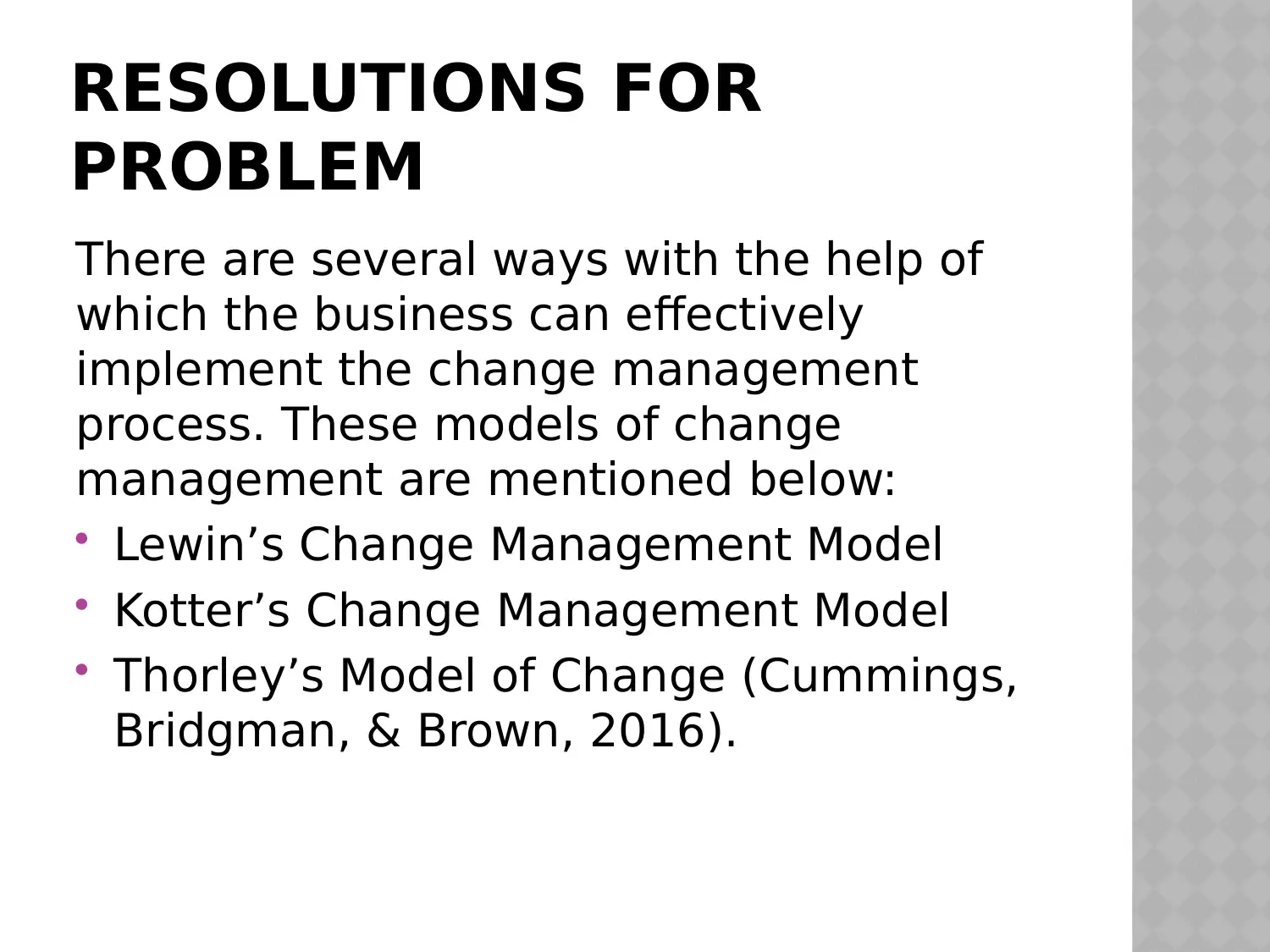
RESOLUTIONS FOR
PROBLEM
There are several ways with the help of
which the business can effectively
implement the change management
process. These models of change
management are mentioned below:
Lewin’s Change Management Model
Kotter’s Change Management Model
Thorley’s Model of Change (Cummings,
Bridgman, & Brown, 2016).
PROBLEM
There are several ways with the help of
which the business can effectively
implement the change management
process. These models of change
management are mentioned below:
Lewin’s Change Management Model
Kotter’s Change Management Model
Thorley’s Model of Change (Cummings,
Bridgman, & Brown, 2016).
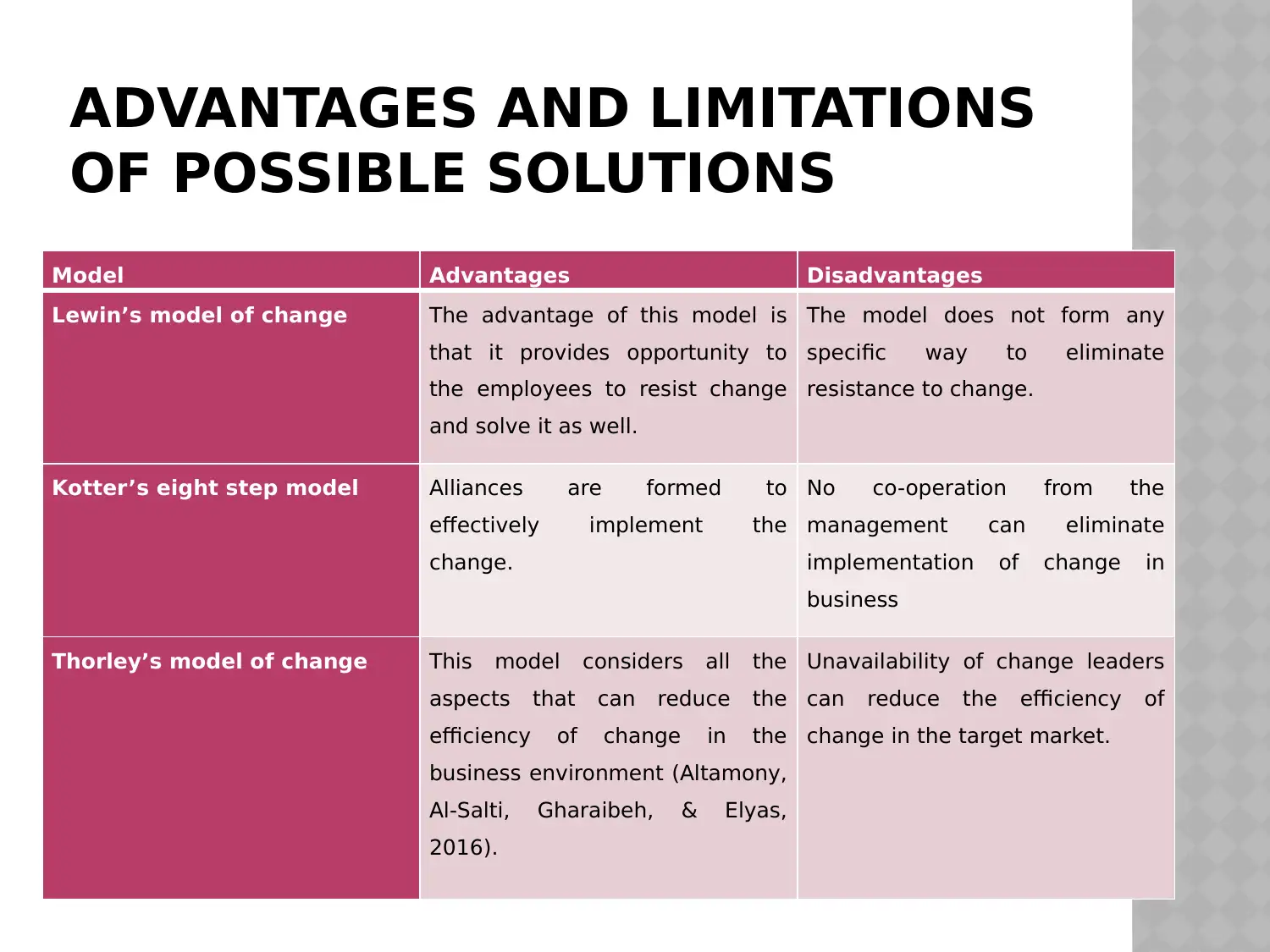
ADVANTAGES AND LIMITATIONS
OF POSSIBLE SOLUTIONS
Model Advantages Disadvantages
Lewin’s model of change The advantage of this model is
that it provides opportunity to
the employees to resist change
and solve it as well.
The model does not form any
specific way to eliminate
resistance to change.
Kotter’s eight step model Alliances are formed to
effectively implement the
change.
No co-operation from the
management can eliminate
implementation of change in
business
Thorley’s model of change This model considers all the
aspects that can reduce the
efficiency of change in the
business environment (Altamony,
Al-Salti, Gharaibeh, & Elyas,
2016).
Unavailability of change leaders
can reduce the efficiency of
change in the target market.
OF POSSIBLE SOLUTIONS
Model Advantages Disadvantages
Lewin’s model of change The advantage of this model is
that it provides opportunity to
the employees to resist change
and solve it as well.
The model does not form any
specific way to eliminate
resistance to change.
Kotter’s eight step model Alliances are formed to
effectively implement the
change.
No co-operation from the
management can eliminate
implementation of change in
business
Thorley’s model of change This model considers all the
aspects that can reduce the
efficiency of change in the
business environment (Altamony,
Al-Salti, Gharaibeh, & Elyas,
2016).
Unavailability of change leaders
can reduce the efficiency of
change in the target market.
⊘ This is a preview!⊘
Do you want full access?
Subscribe today to unlock all pages.

Trusted by 1+ million students worldwide
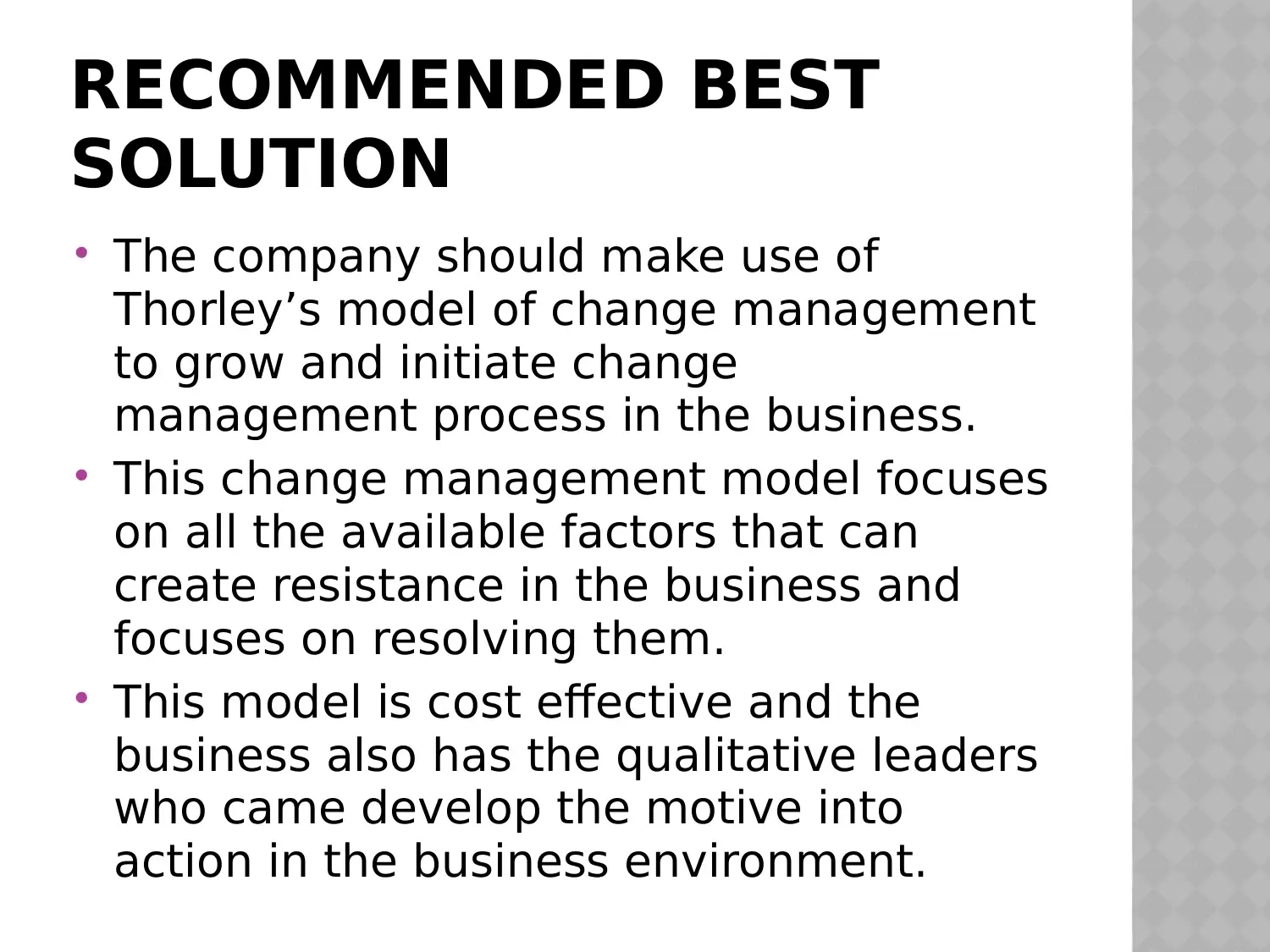
RECOMMENDED BEST
SOLUTION
The company should make use of
Thorley’s model of change management
to grow and initiate change
management process in the business.
This change management model focuses
on all the available factors that can
create resistance in the business and
focuses on resolving them.
This model is cost effective and the
business also has the qualitative leaders
who came develop the motive into
action in the business environment.
SOLUTION
The company should make use of
Thorley’s model of change management
to grow and initiate change
management process in the business.
This change management model focuses
on all the available factors that can
create resistance in the business and
focuses on resolving them.
This model is cost effective and the
business also has the qualitative leaders
who came develop the motive into
action in the business environment.
Paraphrase This Document
Need a fresh take? Get an instant paraphrase of this document with our AI Paraphraser
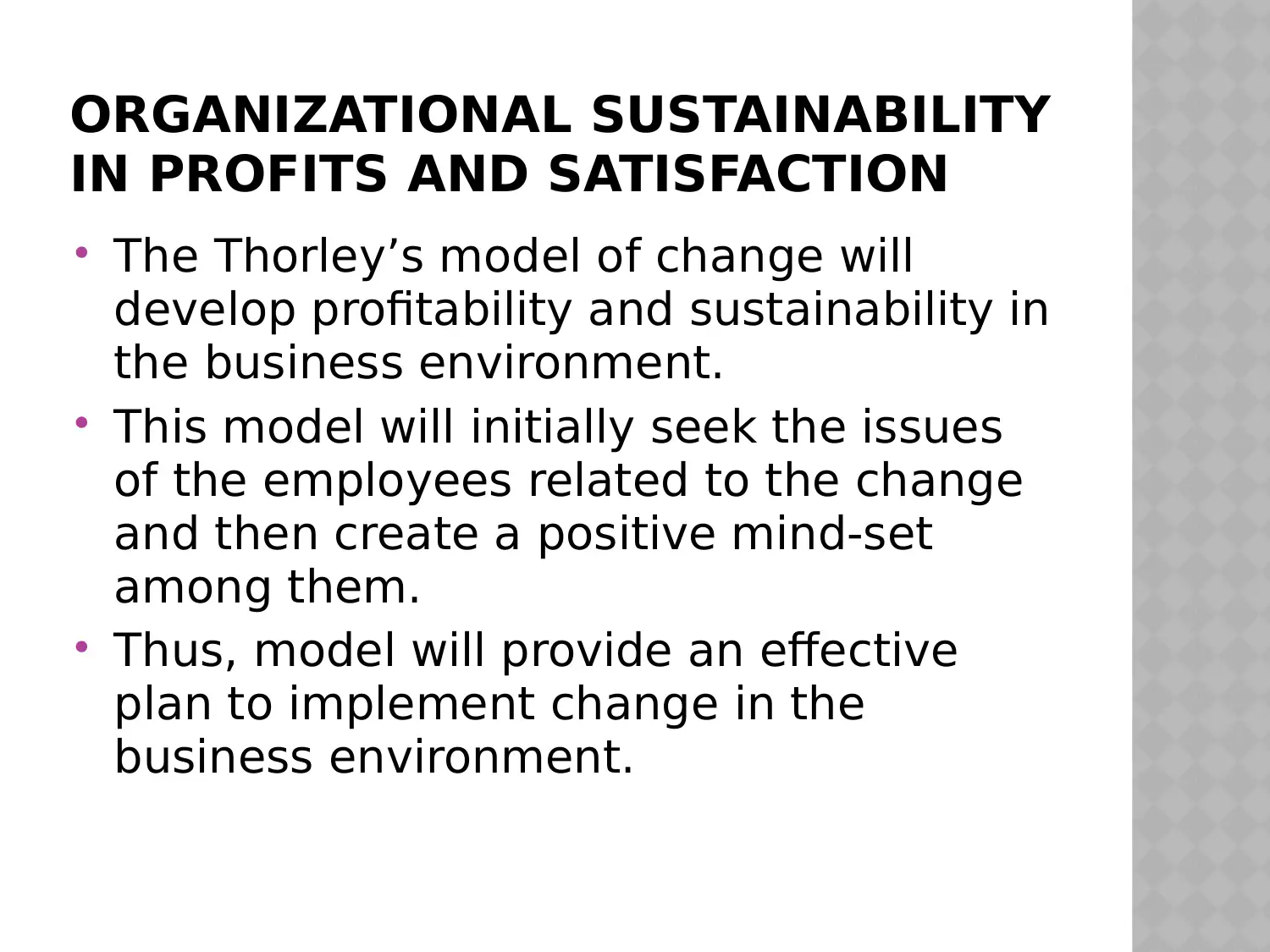
ORGANIZATIONAL SUSTAINABILITY
IN PROFITS AND SATISFACTION
The Thorley’s model of change will
develop profitability and sustainability in
the business environment.
This model will initially seek the issues
of the employees related to the change
and then create a positive mind-set
among them.
Thus, model will provide an effective
plan to implement change in the
business environment.
IN PROFITS AND SATISFACTION
The Thorley’s model of change will
develop profitability and sustainability in
the business environment.
This model will initially seek the issues
of the employees related to the change
and then create a positive mind-set
among them.
Thus, model will provide an effective
plan to implement change in the
business environment.
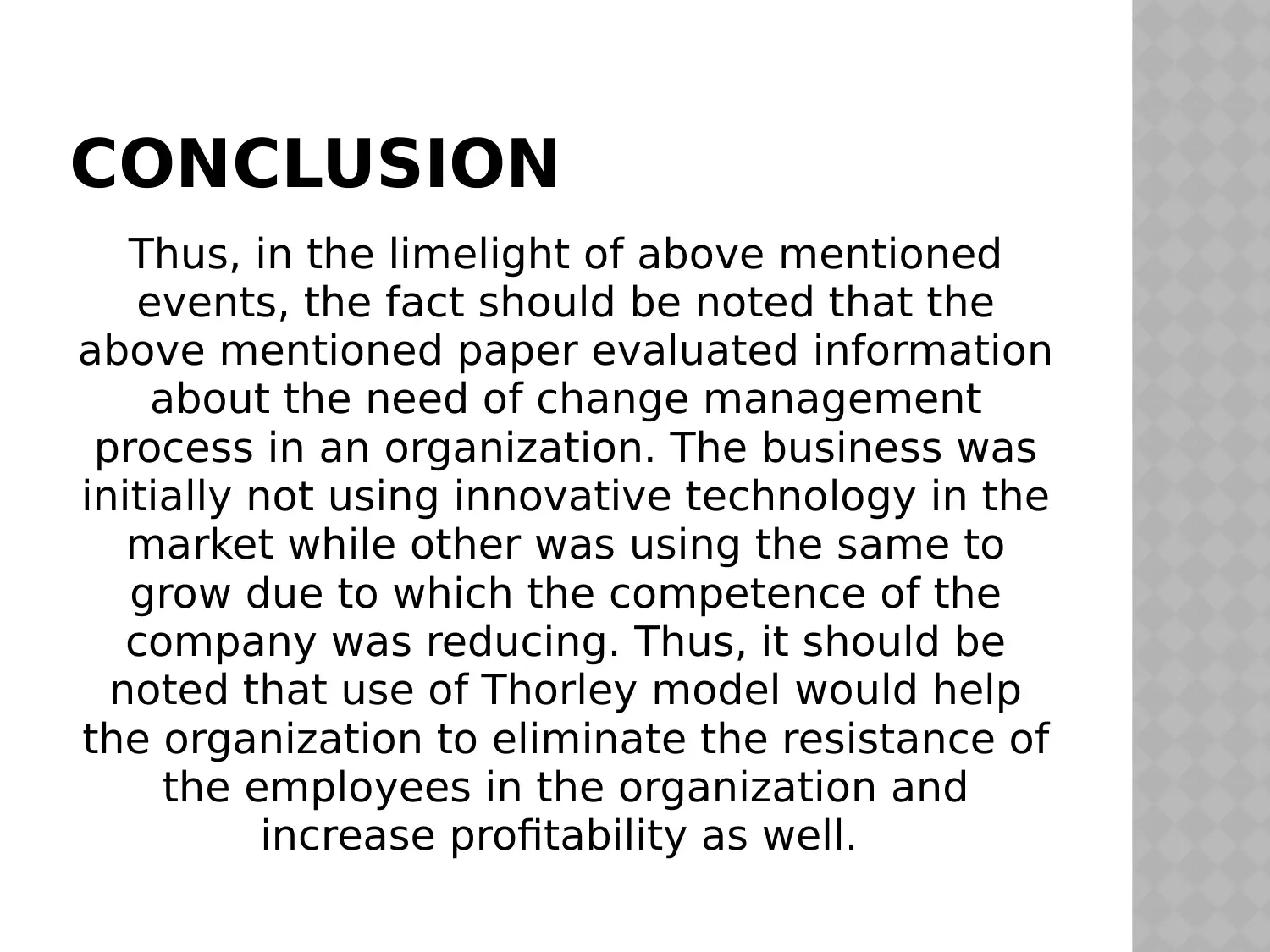
CONCLUSION
Thus, in the limelight of above mentioned
events, the fact should be noted that the
above mentioned paper evaluated information
about the need of change management
process in an organization. The business was
initially not using innovative technology in the
market while other was using the same to
grow due to which the competence of the
company was reducing. Thus, it should be
noted that use of Thorley model would help
the organization to eliminate the resistance of
the employees in the organization and
increase profitability as well.
Thus, in the limelight of above mentioned
events, the fact should be noted that the
above mentioned paper evaluated information
about the need of change management
process in an organization. The business was
initially not using innovative technology in the
market while other was using the same to
grow due to which the competence of the
company was reducing. Thus, it should be
noted that use of Thorley model would help
the organization to eliminate the resistance of
the employees in the organization and
increase profitability as well.
⊘ This is a preview!⊘
Do you want full access?
Subscribe today to unlock all pages.

Trusted by 1+ million students worldwide
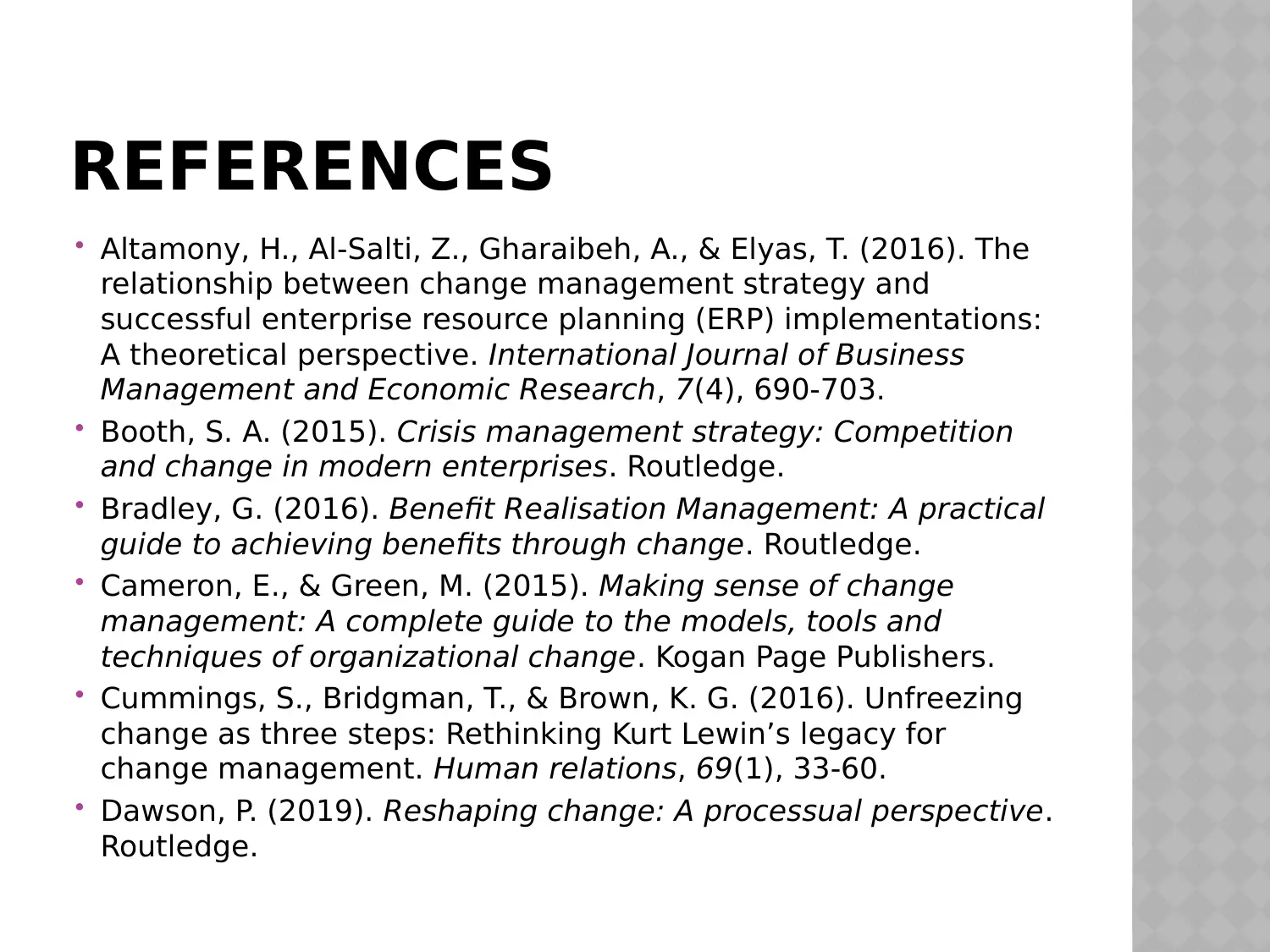
REFERENCES
Altamony, H., Al-Salti, Z., Gharaibeh, A., & Elyas, T. (2016). The
relationship between change management strategy and
successful enterprise resource planning (ERP) implementations:
A theoretical perspective. International Journal of Business
Management and Economic Research, 7(4), 690-703.
Booth, S. A. (2015). Crisis management strategy: Competition
and change in modern enterprises. Routledge.
Bradley, G. (2016). Benefit Realisation Management: A practical
guide to achieving benefits through change. Routledge.
Cameron, E., & Green, M. (2015). Making sense of change
management: A complete guide to the models, tools and
techniques of organizational change. Kogan Page Publishers.
Cummings, S., Bridgman, T., & Brown, K. G. (2016). Unfreezing
change as three steps: Rethinking Kurt Lewin’s legacy for
change management. Human relations, 69(1), 33-60.
Dawson, P. (2019). Reshaping change: A processual perspective.
Routledge.
Altamony, H., Al-Salti, Z., Gharaibeh, A., & Elyas, T. (2016). The
relationship between change management strategy and
successful enterprise resource planning (ERP) implementations:
A theoretical perspective. International Journal of Business
Management and Economic Research, 7(4), 690-703.
Booth, S. A. (2015). Crisis management strategy: Competition
and change in modern enterprises. Routledge.
Bradley, G. (2016). Benefit Realisation Management: A practical
guide to achieving benefits through change. Routledge.
Cameron, E., & Green, M. (2015). Making sense of change
management: A complete guide to the models, tools and
techniques of organizational change. Kogan Page Publishers.
Cummings, S., Bridgman, T., & Brown, K. G. (2016). Unfreezing
change as three steps: Rethinking Kurt Lewin’s legacy for
change management. Human relations, 69(1), 33-60.
Dawson, P. (2019). Reshaping change: A processual perspective.
Routledge.
Paraphrase This Document
Need a fresh take? Get an instant paraphrase of this document with our AI Paraphraser
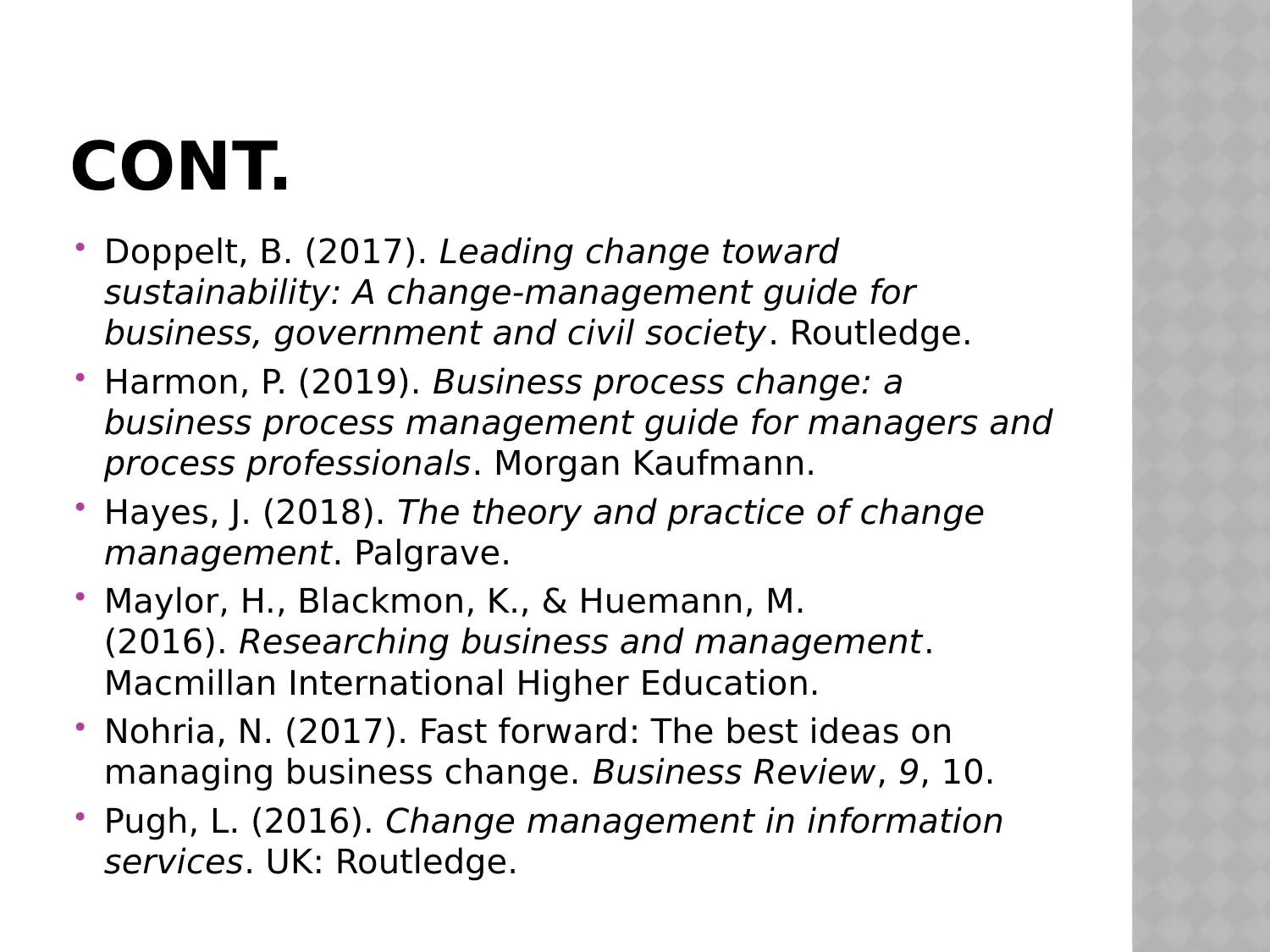
CONT.
Doppelt, B. (2017). Leading change toward
sustainability: A change-management guide for
business, government and civil society. Routledge.
Harmon, P. (2019). Business process change: a
business process management guide for managers and
process professionals. Morgan Kaufmann.
Hayes, J. (2018). The theory and practice of change
management. Palgrave.
Maylor, H., Blackmon, K., & Huemann, M.
(2016). Researching business and management.
Macmillan International Higher Education.
Nohria, N. (2017). Fast forward: The best ideas on
managing business change. Business Review, 9, 10.
Pugh, L. (2016). Change management in information
services. UK: Routledge.
Doppelt, B. (2017). Leading change toward
sustainability: A change-management guide for
business, government and civil society. Routledge.
Harmon, P. (2019). Business process change: a
business process management guide for managers and
process professionals. Morgan Kaufmann.
Hayes, J. (2018). The theory and practice of change
management. Palgrave.
Maylor, H., Blackmon, K., & Huemann, M.
(2016). Researching business and management.
Macmillan International Higher Education.
Nohria, N. (2017). Fast forward: The best ideas on
managing business change. Business Review, 9, 10.
Pugh, L. (2016). Change management in information
services. UK: Routledge.
1 out of 11
Related Documents
Your All-in-One AI-Powered Toolkit for Academic Success.
+13062052269
info@desklib.com
Available 24*7 on WhatsApp / Email
![[object Object]](/_next/static/media/star-bottom.7253800d.svg)
Unlock your academic potential
Copyright © 2020–2026 A2Z Services. All Rights Reserved. Developed and managed by ZUCOL.





